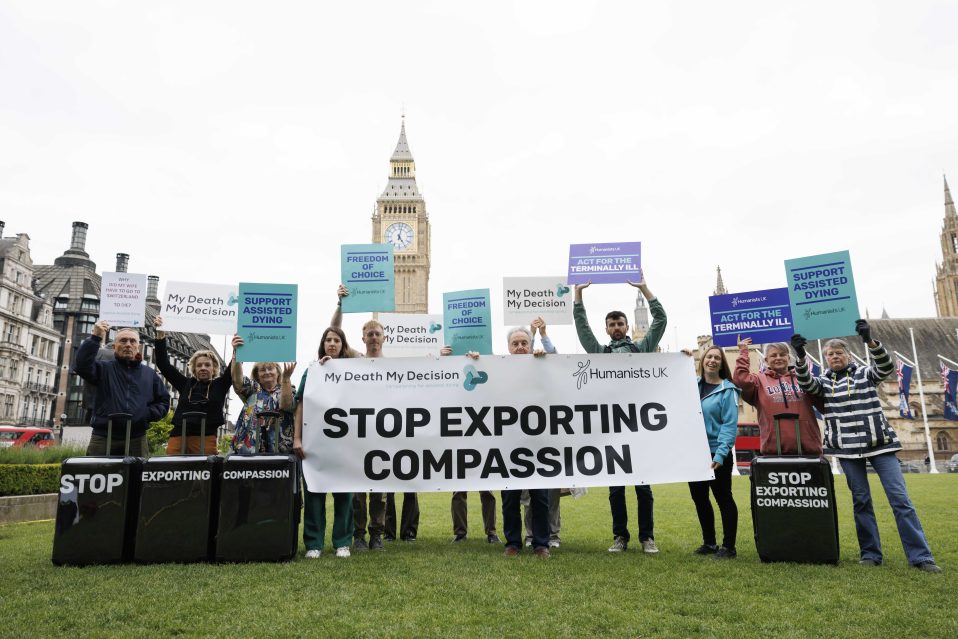Today the Mail on Sunday published an article about the father of an MDMD supporter who ended his life at Dignitas. Penny’s father Ron Hall suffered from early stage dementia. The psychiatric assessment to ensure he still had mental capacity to make the life ending decision was done by MDMD’s associate coordinator, Colin Brewer. Interestingly, the article goes on to point out that Colin regularly has to refuse an assessment of adequate mental capacity when, in his professional opinion, the person is no longer lucid enough to make the decision to take their life.
Dementia is a particular concern for MDMD. It is now the leading cause of death in England and Wales. Many more people die with dementia rather than of it. The issue of dementia highlights the reason why MDMD does not want assisted dying to be restricted to those who are expected to die within six months. By this stage, terminally ill dementia sufferers are very unlikely to have sufficient mental capacity to safely make the decision, and they will have already suffered for far too long.
Opponents to a change in the law warn that dementia sufferers who choose to end their lives while they still have mental capacity may be shortening their lives unnecessarily, as they may die of something else first. This is true, but some of us would prefer to sacrifice a period of diminishing life quality rather than run the risk of having to suffer the living nightmare that the later stages of dementia can become. It is a difficult choice for anyone – but one that we should be allowed to make for ourselves, provided we are well informed, but before it is too late, we no longer have capacity, and we end up like Joan Cheatle.
A spokesman for the group Care Not Killing commented that “a lot of people fear that when there is a care crisis within the NHS there will be more pressure on people who are elderly and frail to think about ending their lives.” MDMD understands this concern. We propose the idea of an extended advance decision – which allows people to record their wish for the option of a medically assisted death, long before they are elderly and frail. Such an advance statement would ensure that their choice was not the result of pressure, should they be considered vulnerable at the time they make their choice.
MDMD are pleased that articles like the one in today’s Mail on Sunday keep the issues in the public eye. We call on those with concerns over the safety of assisted dying legislation to work with us constructively to find a safe proposal to allow people a “good death” when, for them, that requires medical assistance to die.
UPDATE 24th January 2017
Following the Mail on Sunday article, Radio 5 live contacted MDMD. This resulted in the radio interview with Penny Hall. A reduced podcast of the interview is available here. For the next few weeks the original full interview is here.
Penny’s interview was followed an hour later by an interview with Baroness Ilora Finlay, chair of National Council for Palliative Care and co-chair of Living and Dying Well. MDMD agrees with Baroness Finlay’s comments that everything possible should be done to enhance the final phase of people’s lives. Where we differ is how to deal with the the situation when a person’s quality of life falls permanently below the level the person is able to tolerate, despite having the best care available. Only the person themselves can judge where that point is for them.
The knowledge that medically assisted suicide is available when things get unbearable can help people enjoy that final phase of life for as long as possible. Without it some people feel that the better option is to end their lives themselves, one way or another, while they still can. The irony is that a carefully designed assisted suicide law, working in partnership with the best palliative care, could actually prolong people’s lives and increase it’s quality by removing the fear that the dying process may at some stage become intolerable and they will be trapped.
Until the palliative care community work with groups like MDMD to find a safe, workable way forward which includes the possibility of a medically assisted death in this country, there will be far too many bad deaths, and people like Penny Hall’s father, who decide that the best death possible for them is an assisted one in Switzerland.







Recent Comments